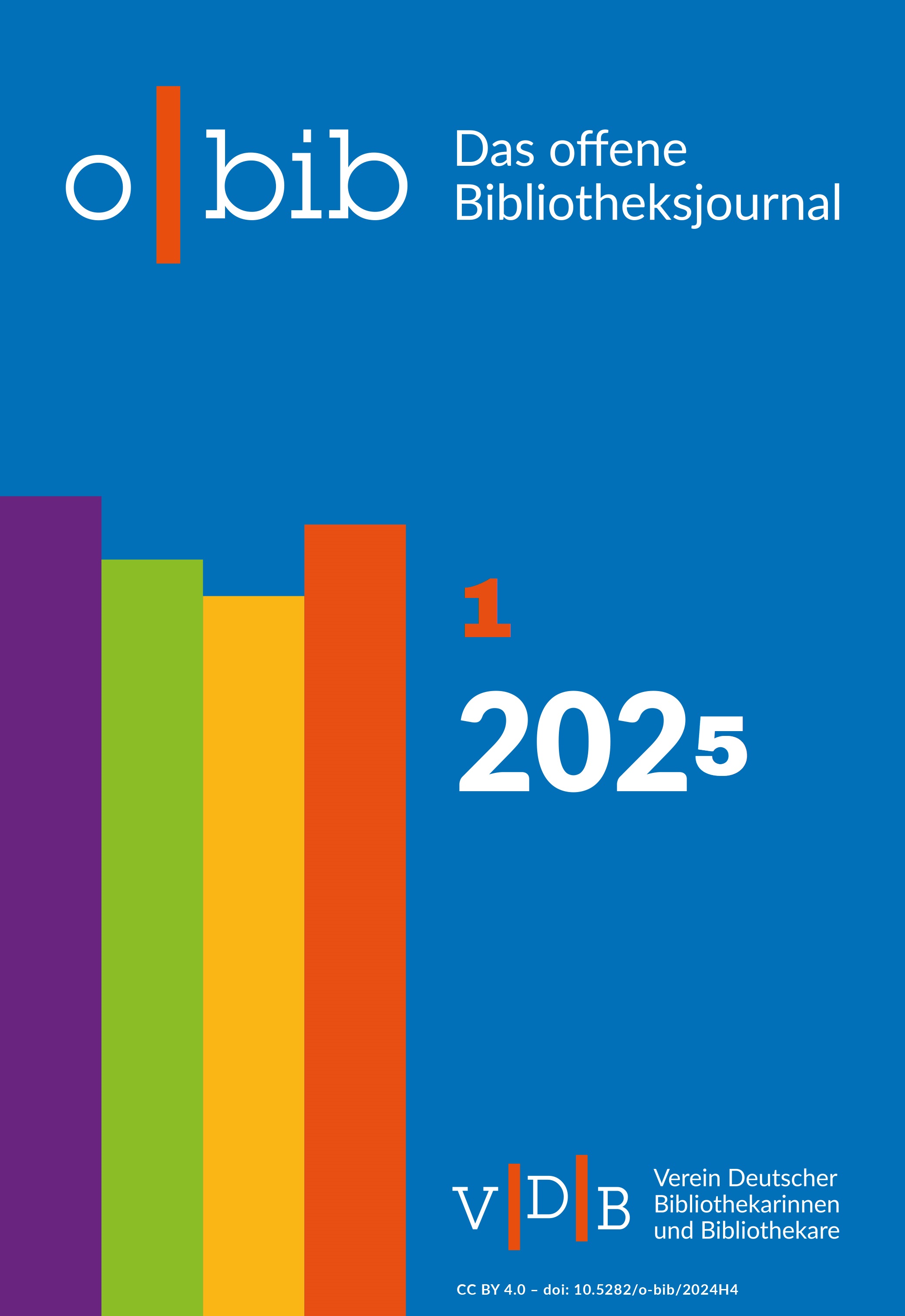Angebote zur Förderung der KI Literacy an deutschen Universitätsbibliotheken
Empirische Befunde aus dem Wintersemester 2023/24
DOI:
https://doi.org/10.5282/o-bib/6031Keywords:
Artificial intelligence (AI), AI literacy, University library, Teaching libraryAbstract
This paper examines the teaching and learning programs on artificial intelligence (AI) which were offered by university libraries in Germany in the winter semester 2023/24 and how they were designed. To this end, in October and November 2023 the websites of 105 university libraries were examined for information on AI education programs. The data collected was then evaluated using descriptive statistical methods. A total of 101 programs at 31 libraries were identified and analysed.
References
Böhme, Lisa: Der Umgang mit künstlicher Intelligenz an deutschen Hochschulbibliotheken. Untersuchung von Veranstaltungsangeboten für Studierende, Bachelorarbeit, Hochschule für Technik, Wirtschaft und Kultur Leipzig, Leipzig 2023. Online: https://nbn-resolving.org/urn:nbn:de:bsz:l189-qucosa2-872796.
Die Bundesregierung: Strategie Künstliche Intelligenz der Bundesregierung, 2018. Online: https://www.bundesregierung.de/resource/blob/997532/1550276/3f7d3c41c6e05695741273e78b8039f2/2018-11-15-ki-strategie-data.pdf, Stand: 20.05.2024.
Eigenbrodt, Olaf: Allgegenwärtigkeit – Angst – Autonomie. Gesellschaftliche Fragen zum Umgang mit Künstlicher Intelligenz in Bibliotheken, in: BuB – Forum Bibliothek und Information 74 (6), 2022, S. 302–305. Online: https://zs.thulb.uni-jena.de/servlets/MCRFileNodeServlet/jportal_derivate_00330573/BUB_2022_06.pdf, Stand: 20.05.2024.
Gasparini, Andrea; Kautonen, Heli: Understanding artificial intelligence in research libraries. An extensive literature review, in: Liber Quarterly 32, 2022, S. 1–36. Online: https://doi.org/10.53377/lq.10934.
Laupichler, Matthias Carl; Aster, Alexandra; Raupach, Tobias: Delphi study for the development and preliminary validation of an item set for the assessment of non-experts’ AI literacy, in: Computers and Education: Artificial Intelligence 4, 2023, S. 1–10. Online: https://doi.org/10.1016/j.caeai.2023.100126.
Long, Duri; Magerko, Brian: What is AI literacy? Competencies and design considerations, in: ACM Conferences, ACM Special Interest Group on Computer-Human Interaction, New York 2020, S. 1–16. Online: https://doi.org/10.1145/3313831.3376727.
Mah, Dana-Kristin; Büching, Corinne: Künstliche Intelligenz in Studium und Lehre. Überblickstudie zu Professuren und Studiengängen der Künstlichen Intelligenz in Deutschland, Berlin 2019. Online: https://www.plattform-lernende-systeme.de/files/Downloads/Diverses/Studie_KI_in_Studium_und_Lehre.pdf, Stand: 20.05.2024.
Plattform Lernende Systeme: Was bedeutet Künstliche Intelligenz?, o. J., https://www.ki-konkret.de/was-ist-ki.html, Stand: 20.05.2024.
Schultka, Holger: Bibliothekspädagogik. Lehren und Lernen in wissenschaftlichen Bibliotheken, München 2018.
Solis, Tobias: Die ChatGPT-Richtlinien der 100 größten deutschen Universitäten, 2023, https://www.scribbr.de/ki-tools-nutzen/chatgpt-universitaere-richtlinien/, Stand: 20.05.2024.
Sühl-Strohmenger, Wilfried: Teaching Library. Förderung von Informationskompetenz durch Hochschulbibliotheken, Berlin 2012 (Bibliothek: Monographien zu Forschung und Praxis, 1).
Downloads
Published
Issue
Section
License
Copyright (c) 2024 Carolin Hilscher, Tobias Seidl, Cornelia Vonhof

This work is licensed under a Creative Commons Attribution 4.0 International License.







